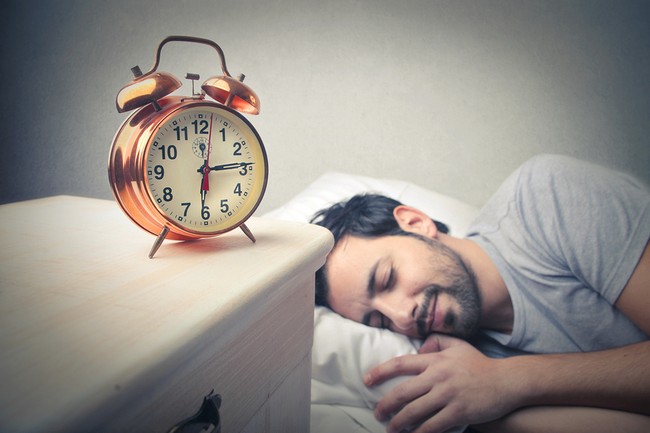- Make It Yourself Lavender Heart-Shaped Bath Bombs!
- 20 Things You Never Knew About “Down There”
- 12 Best Foods For Those Suffering From Arthritis Pain
- 12 Personal Hygiene Mistakes Almost Everyone Makes (Mom Never Told You About #4!)
- 15 Medicinal Plants And Herbs From The Cherokee People
- 12 Mind-Blowing Benefits Of Drinking Coconut Water During Pregnancy
- 12 Outstanding Winter Foods That Won’t Fatten You Up Like A Christmas Turkey
Top 12 Sleep Tips for a Long and Healthy Life

Photo credit: bigstock.com
Too often, too many of us take a good night’s sleep for granted. When all is said and done, sleep deprivation cheats your body out of numerous health benefits.
Do you feel crabby most of the time? Maybe you feel worn out by 3PM. Perhaps all you really need is sleep. For some people, that is easier said than done. Worries about work, family problems, unexpected problems such as illnesses, marriage problems, or unplanned expenses, can keep anyone from getting the sleep they need.
There is some evidence that shows that staying up late watching television or using computers or cell phones late at night can increase your risk of developing certain types of cancer. Studies also show that staying up past 11:30PM (for most people working a typical schedule) can affect your performance at work or school. Some studies even show that not getting enough quality sleep can lead to a shorter life.
Take a look at the following tips that can ensure you get the best sleep possible for not only a healthy life, but a long one as well.
1. Make a Bedtime Ritual
Following a similar pattern or routine before you go to bed will send signals to your body that it should quiet down and go to sleep soon. This type of ritual varies and not everything works for everyone, but you might want to try drinking a cup of chamomile tea, taking a warm bath or shower, changing into pajamas and reading a book. Find something that seems to calm you and soothe you and then make that a habit so your body can get the signal that it’s time for bed. Find out 5 simple changes to reset your sleeping patterns.
2. Make Your Bed a Good One
It’s often said that money spent on things that go between you and the ground is money well spent. This means you should invest in quality things such as shoes, tires, and mattresses. A cheap mattress will wear out in a year or two and give you a terrible backache. You spend about 1/3 of your life sleeping– doesn’t it make sense to buy a good quality mattress? This is one of the easiest ways to improve your sleep. Although it is true that a good mattress can be expensive, it is an investment that will last you for 20 years or more.
3. Limit Naps
Taking long naps during the day can interfere with your sleep, especially if you are already suffering from insomnia or waking up during the night. Although you might feel very sleepy during the day, resist the urge to nap for longer than 20 minutes. If you work nights, you need to really be diligent about getting the sleep you need. Be certain to use blackout shades or curtains and keep the room as cool as possible to simulate night.
4. Re-evaluate Your Bedroom
The three most important factors regarding sleep are lighting, noise, and temperature. Sleeping in complete darkness (as much as possible) is extremely important and any items that have always on lights should be unplugged or stored someplace else. Anything that makes noises that beep or make buzzing noises should also be banished from your bedroom. Try to keep the temperature of the room below 65 degrees, as this has been shown to be the best temperature to induce a good night’s sleep.
Continue to Page 2

Photo credit: bigstock
5. The Bedroom Should be for Sleep and Sex
Don’t use your bed for entertainment purposes. When you eat in bed, watch TV, play video games, or surf the internet from your phone, you send confusing signals to your brain. Help your brain associate being in bed with sleeping or sex. Watch TV and do those other things in your living room, not the bedroom.
6. Keep a Regular Schedule
As much as humanly possible, go to bed and wake up at the same time each day. Your body loves routine and it works best when it has a set schedule. If you go to bed at different times, your brain and body will be confused as to when it is supposed to sleep.
7. Watch What You Eat and Drink
It’s not a good idea to go to bed when you are really full, but it’s also not good to go to bed hungry. The discomfort in your tummy might keep you from sleeping well. If you find you are getting up too often to go pee at night, limit how much you drink an hour or two before bed. You should also avoid alcohol, caffeine, and nicotine. Both caffeine and nicotine take hours to wear off and can keep you awake and although alcohol might make you feel sleepy right away, it tends to wake people up a few hours after it wears off. Stick with a cup of decaf coffee or decaffeinated herbal tea, or just plain water.
SEE ALSO: 10 Bedtime Things to Do to Wake Up Feeling Happy
8. Watch Light and Screen Time
Try to get as much natural sunlight during the daylight hours as you possibly can. After sundown, keep the lights in your house dim about 2 hours before bed. You should also limit your screen time and turn them off at least one hour before bed. Studies show that the light from our computer screens, cell phones, televisions, tablets, laptops, and similar items interrupt our body’s natural production of melatonin, which will keep you from getting good quality sleep.
Continue to Page 3

Photo credit: bigstock.com
9. Figure Out Your Sleep Preferences
Find out which room temperature works best for you (for most people, that is 65 or below but everyone is different) , which type of mattress you sleep best on (harder, softer), how many hours sleep is the ideal amount for you, and what type of pillow suits you best (full, flat, lumpy, several pillows, no pillow). Once you know the perfect conditions that make you feel most comfortable and make you wake up feeling refreshed, keep your bedroom in that type of condition so that you can get your rest and give your body the quality sleep time it needs to repair itself. Read also sleeping positions that are good for you.
10. Focus on Relaxing, Not Sleeping
It might sound strange, but when you only focus on how much sleep you are getting, you don’t get much! Have you ever gone to bed and after about an hour you realize that you aren’t going to fall asleep quickly, so you start checking the clock every 5 minutes and thinking “If only I could fall asleep now, I could still get in a good 7 hours…6 hours…5 hours.” Rather than concentrate on how many hours you should be getting, or aren’t getting, focus on relaxing. A body and mind that is relaxed will fall asleep easily. You might want to practice tightening each part of your body, and then relaxing it completely. Turn on a white noise machine and pretend that you are lying on a beautiful beach. Don’t think about sleep, think about relaxing and sleep will come.
11. Manage Your Stress
You can’t sleep when your mind is going over all the things you have to do the next day and trying to figure out how you will manage to do it all. Stress cannot be completely avoided, but it can be managed. Get organized, delegate certain tasks when you can, set priorities, and be sure that you make your own health and well-being a priority. Admit and accept that you are human and that you need breaks. Take them! Call a friend or family member and have a good laugh, get some exercise, practice meditation and yoga. Some people find that just before bed, they jot down the things they will do the next day and then imagine leaving their troubles on that piece of paper. Troubles and tasks can wait for the morning.
12. Enjoy Healthy Lifestyle Habits
Although a good night’s sleep is super important, it won’t make up for daytime bad habits such as eating a diet filled with junk food, fast food, sugar, lack of exercise, smoking, and excessive drinking. Sleeping well each night is just one part of an overall healthy lifestyle that will keep you free from disease and give you a long and happy life.
References:
































